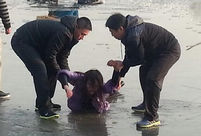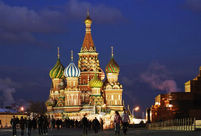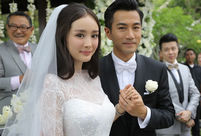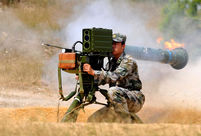 Shocking moments when PLA's weapons open fire
Shocking moments when PLA's weapons open fire Famous Lanzhou beef noodles
Famous Lanzhou beef noodles Armed Police hold anti-terrorism drill in SE China's Xiamen
Armed Police hold anti-terrorism drill in SE China's Xiamen Harbin Int'l Ice and Snow Festival opens
Harbin Int'l Ice and Snow Festival opens 'Jin' named the word of the year by cross-strait netizens
'Jin' named the word of the year by cross-strait netizens Chinese scientific expedition goes to build new Antarctica station
Chinese scientific expedition goes to build new Antarctica station
 Chinese naval escort fleet conducts replenishment in Indian Ocean
Chinese naval escort fleet conducts replenishment in Indian Ocean 17th joint patrol of Mekong River to start
17th joint patrol of Mekong River to start China's moon rover, lander photograph each other
China's moon rover, lander photograph each otherMOSCOW, Jan. 11 -- Japanese Prime Minister Shinzo Abe's visit to the Yasukuni Shrine and his government's provocative policies towards neighboring countries are leading Japan in a very dangerous direction, Chinese Ambassador to Russia Li Hui said Friday.
In an article published by Russia's Interfax news agency, Li strongly condemned Abe's Dec. 26 visit to the shrine, which honors Japan's war dead, including 14 convicted class-A World War II war criminals.
Abe's move challenged generally accepted rules and norms, and was "an open provocation against justice in international relations and insolent trampling of mankind's common sense," Li said in the article.
The shocking action has caused concern not only in neighboring countries such as China and Russia, but also throughout the international community, he said.
According to Li, the visit was by no means a Japanese internal affair, nor was it Abe's private business, nor merely an issue in China-Japan and South Korea-Japan relations.
The real problem, Li said, was that the Japanese leadership was not ready to correctly evaluate and deeply rethink its past of militarism, aggression and colonialism, nor was it ready to obey the UN Charter and principles and follow a peaceful path.
It was a core issue concerning the line between aggression and repulsion, justice and evil, light and darkness, the Chinese diplomat said, adding that it was also a serious issue of principle concerning the political basis of Japan's relations with neighboring countries and with the international community as a whole.
During his first year in office, Abe promoted his theory, whitewashing the history of militarism, aggression and colonialism, and changed Japan's defense policy, increasing its defense budget and capabilities, Li noted.
In addition, Abe had snubbed Japan's pacifist constitution, facilitated a sharp rise of right-wing forces, and staged a farce about the Diaoyu Islands.
He also tried to play up the so-called China threat, provoked conflicts among Asia-Pacific countries and sought excuses for the revival of Japanese militarism, the diplomat said.
"The country has become the largest 'troublemaker' in Asia," Li said.
China and Russia, fighting fascism during World War II and now serving as permanent members of the UN Security Council, have been united under the common understanding and responsibility to defend world justice and post-war order, the diplomat said.
He recalled a joint declaration released on Sept. 28, 2010, by leaders of Russia and China to mark the 65th anniversary of the end of World War II, which condemned any attempts to falsify the history of World War II, to excuse the Nazis, militarists and their accomplices, and to smear liberators.
Chinese Foreign Minister Wang Yi and his Russian counterpart, Sergei Lavrov, held a phone conversation on the eve of 2014, during which both sides opposed Abe's visit to the shrine, deeming it a provocation to Japan's Asian neighbors.
In the article, Li also mentioned recently released movie "Stalingrad," saying the popularity of the movie "confirms the two nations' adherence to justice, their uncompromised moral position, respect to history, and decisiveness to protect the results of World War II," Li said.
The Chinese government and people would never forget the Soviet soldiers and civilians who offered help during the war, Li said.
China would never accept nor tolerate Japanese militarists' remarks and actions, which still lacked admission and repentance of the crimes they had committed, Li said.
"Japan's attempt to deny its past as an aggressor, as well as its attempts to revive militarism, must be perceived by all people in the world with disdain and be rejected," Li concluded.
 In photos: Ten 'tuhao' devices in 2013
In photos: Ten 'tuhao' devices in 2013 College students saved from an ice hole by brave citizens
College students saved from an ice hole by brave citizens Gallery: Top 10 box office hits in 2013
Gallery: Top 10 box office hits in 2013 Beautiful churches around the world
Beautiful churches around the world Yang Mi, Hawick Lau hold wedding in Bali
Yang Mi, Hawick Lau hold wedding in Bali 'Phubbing' people seen everywhere
'Phubbing' people seen everywhere World's biggest snack shop in China
World's biggest snack shop in China Shocking moments when PLA's weapons open fire
Shocking moments when PLA's weapons open fire World's fastest train CRH380A assembled in E China
World's fastest train CRH380A assembled in E China Top 10 box office hits in 2013
Top 10 box office hits in 2013 In photos: Ten 'tuhao' devices in 2013
In photos: Ten 'tuhao' devices in 2013 Real estate tycoon measures PM2.5
Real estate tycoon measures PM2.5  'I am on a journey to lose weight'
'I am on a journey to lose weight' 'Cute' artifacts exhibited in Nanjing Museum
'Cute' artifacts exhibited in Nanjing Museum Advanced Chinese weapons that stepped into spotlight in 2013
Advanced Chinese weapons that stepped into spotlight in 2013Day|Week|Month